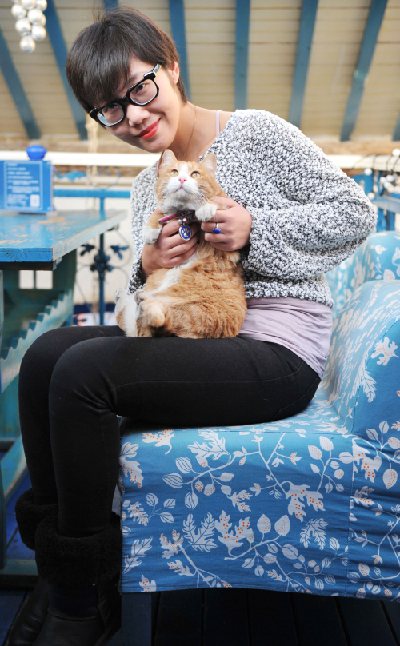|
 |
|
Sirena's manager Li Xia (WEI YAO) |
Spending time in Sirena's upstairs loft area, one could be forgiven for thinking he or she had walked onto the set of Wes Anderson's 2004 movie The Life Aquatic With Steve Zissou. The cozy Beijing cat café's interior decoration is best described as "nautical kitsch," carrying a color motif of whites coupled with shades of blue and aquamarine. Downstairs, a giant mobile featuring silver fish overhangs the interior of the front door. Upstairs, the wall to the immediate left is adorned with faded wanted posters of characters from pirate-themed anime One Piece and on the opposite wall are hung photographs of Mediterranean villas.
"The cats mainly sleep upstairs at night and we provide food, water and toilet facilities for them," said the café's manager, 31-year-old Li Xia. Li was hiply attired in a baggy acrylic green polo neck jumper and skintight leather pants, and sporting designer glasses. Inside, the café is warm, and softly lilting bossa nova music contributes to a soporific atmosphere. Fast asleep next to her lie two of the café's 10 kitties: a white cat and a calico—both longhairs.
With three fur babies of her own, Li was formerly a customer of the 2011-founded establishment before taking over as manager one year ago, having befriended proprietor Zhang Lange. In a previous life, she was a corporate event planner.
A furocious craze
When Beijing Review inquired whether cat cafés are on the up or in decline in China's capital, Li replied that business is "booming," though she admitted to fearing over-saturation. The phenomenon has its roots in Asia—a part of the world long engaged in a profound love affair with all things feline. In 2000, a Hello Kitty promotion by McDonald's prompted a full-scale riot in Singapore as fans vied with one another for the collectibles on offer.
The first cat café recorded, Cat Flower Garden, opened its doors in Taiwan in 1998 and drew the attention of tourists from Japan, where the fad quickly spread with Tokyo's first such café opening in 2004. In many establishments, patrons are subject to a cover charge, making the business a form of pet rental. A chain of cat cafés, Cat Attic, is now proliferating across South Korea, and similarly themed coffee shops operate in Malaysia and Thailand. One idiosyncratic venture in Japan has even added goats for variety.
Sixteen years on, though it has taken somewhat longer to catch on in the West, the concept is now spreading like a case of the fleas. Cat cafés exist in 14 countries in Europe, including tourist destinations such as London and Paris. Across the pond, feline-themed coffee houses are open, or due to open, in 17 cities, towns and regions in North America, covering major metropolises such as Toronto, New York and San Francisco. Similar ventures are also scheduled to open for business in Australia and the Bahamas. In short, the industry appears to have come within a whisker of conquering the entire planet.
Clawing back a profit
Li informs us, that unlike other cat cafés, Sirena was not originally intended to be a cat café. Having visited Greece, Zhang's original ambition was simply to open a Mediterranean-style coffee bar. An avid cat lover, she encouraged strays to come inside and quickly found that they were a draw for customers. The rest is history. In addition to the café, Zhang has also founded two sister businesses also under the Sirena moniker: a gastropub and a boutique hotel.
Like in most major cities, life for cafés, bars and restaurants in Beijing is brutally competitive. This time last year, the English-language entertainment and listings magazine The Beijinger ran a list of the "10 Bars We'll Miss in 2014," indicating that neither excellent service nor prime location necessarily provides insulation against failure. Since Sirena is situated along the chic renovated Wudaoying Hutong close to the tourist-heavy Yonghegong Lama Temple area, one can surmise rent can't be cheap and the abundance of cafés nearby means no shortage of local competition. So how many of its nine lives does Sirena have left?
"We have no special advantages," Li asserted modestly. She suspects, however, that the reason why customers keep on coming back is the attentive yet unobtrusive service. Li stated that their patrons are welcome to stay for as long as they please during the café's daily opening hours of 11 a.m-2 a.m., and there is no pressure to buy anything. A section of the café's upstairs area comes replete with a phone, allowing customers to call in their order downstairs, so as to prevent shouts for service from disrupting Sirena's tranquil atmosphere.
|
